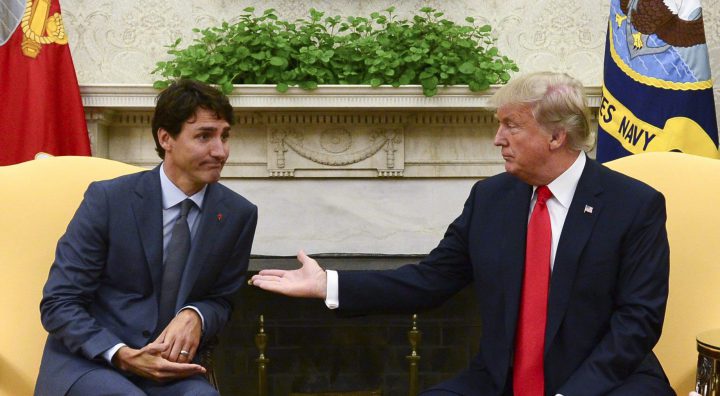U.S. lawmakers stated this week that renegotiating NAFTA is not the country’s biggest economic priority.

It’s the latest blow to Canadian and Mexican officials who’ve been working to modernize the deal — or simply keep it alive. U.S. President Donald Trump has maintained throughout the trade talks that the country will leave the deal if things don’t go the way they want.
WATCH: Is Canada being too nice with NAFTA?

The free trade agreement’s days could be limited if the U.S. stands by its words. The Royal Bank of Canada (RBC) takes a look at what life after NAFTA could be like.
READ MORE: A foolproof explanation of what’s going on with NAFTA
An unpredictable future
The termination of NAFTA would certainly disrupt the Canadian economy, but the exact effects will be unclear until a replacement for the trade deal is created, RBC’s Life After NAFTA report says.
The report notes that a bilateral trade deal between just Canada and the U.S. could replace NAFTA, but that wouldn’t necessarily solve problems.
READ MORE: Donald Trump says U.S. will no longer ‘be taken advantage of’ when it comes to trade
“But given the Trump administration’s protectionist bent, a bilateral arrangement may not safeguard Canada from ongoing punitive trade actions — consider recent U.S. moves to levy tariffs against Canadian softwood lumber and Bombardier-manufactured jets.”
WATCH: Justin Trudeau refuses to address Stephen Harper NAFTA letter

Slow GDP growth for Canada from tariff hike

Get weekly money news
If the United States sticks to regulations set by the World Trade Organization (WTO), RBC predicts that Canadian GDP could drop by a total of one per cent in up to 10 years.
Regulations from the WTO, which the U.S. has previously agreed to, would set an “across-the-board” tariff of about 3.5 per cent between the two countries.
WATCH: U.S. NAFTA representative surprised, disappointed by resistance to change

Nathan Janzen, a senior economist at the bank, explained that all three countries in NAFTA are also part of the WTO deal.
“The world hasn’t stood still in terms of globalization since the NAFTA agreement was reached,” Janzen told Global News.
“So, if NAFTA were to be fully eliminated, Canada, the U.S. and Mexico would all be subject to WTO tariff rates, and those tariff rates are not actually as high as you might think.”
“If you go from free trade to 3.5 per cent average tariff, it’s not nothing and it’s not good for the economy over the longer run, but it’s maybe not as short-run disastrous overall as sometimes thought,” Janzen said.
Canadian workers, industries that will be hurt
Even if the tariff increases are small, the RBC report estimates that 500,000 Canadian jobs in “highly trade-sensitive sectors” will be affected if NAFTA is killed. And industries that depend heavily on U.S. trade will see a sizeable negative impact on business.
That’s because NAFTA has been in place for more than two decades, and numerous industries are interconnected.
READ MORE: How Canada has been affected by the ‘predictably unpredictable’ president
The report cites Canada’s auto industry and its workers as some that will be hurt if NAFTA is cancelled. It notes that Canada exported $63 billion worth of finished vehicles down south last year. The auto industry also has heavy trade flow across the border, with the same auto parts travelling across the two countries several times during production.
Each part would be subject to tariffs every time it travelled across the border, which Janzen explains, would add up.
Higher tariffs will impact dozens of other manufacturing industries such as household appliances, electronics, and cleaning products.
WATCH: Canada, Mexico reject U.S. NAFTA demands

The worst-case scenario
With the unpredictable nature of Trump’s presidency, it is possible that the U.S. may not abide by WTO tariff rate.
Calling it a “Trump tariff tantrum,” the report cites the president’s promise of putting “America First.”
But it adds that this is just a “remote possibility,” as it would also open the doors to retaliation from other countries. The WTO rules are also binding, and the U.S. could face disciplinary action for neglecting them.
“It’s a less likely outcome, I would think. But he is an unpredictable president,” the RBC economist said.
Will U.S. politicians care if NAFTA is cancelled?
While the possible cancellation of NAFTA is a top concern for Canadian officials, it’s uncertain whether politicians south of the border are as worried about the trade deal.
Bill Reinsch, the former head of the National Foreign Trade Council, says Trump’s move to end NAFTA would spark criticism from Congress, but no action.
WATCH: Canada, Mexico say ‘poison pill’ threat by U.S. won’t add extra pressure to NAFTA talks

- B.C. to adopt permanent daylight saving time, after springing forward one more time
- In London, Poilievre pitches new UK, Australia, New Zealand partnership
- No more federal budget watchdog in Ottawa as interim PBO’s term expires
- Danielle Smith says Iran war underscores need for new Alberta pipeline to the coast








Comments
Want to discuss? Please read our Commenting Policy first.